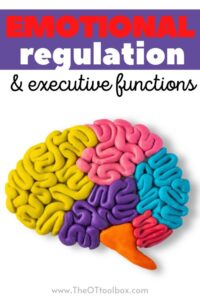Welcome back to the Welcome Strengthening Executive Function Skills in Women with ADHD Part 5. Last time we looked at memory and a woman with ADHD ability to keep track of and manage information for a brief period, a bit like a mental sticky note. For those of us with ADHD, our sticky note is small and tends to unstick itself pretty quickly
This time we’re looking at Emotion—the fifth of our six executive functions. Almost a third of women with ADHD rate a lack of emotional control as our most troubling symptom, yet the diagnostic criteria makes no mention of it.
So why are we so often troubled by feelings of rejection, oversensitivity, frustration and anger? Why don’t these hugely significant symptoms even appear in any of the diagnostic definitions of ADHD? And, most importantly, what can we do to feel calm and controlled in times of stress?
Emotions for a women with ADHD can be big. Really big. Women can experience incredible highs and crushing lows, sometimes within moments of each other. Women with ADHD prone to sudden emotional outbursts, tend to have a low tolerance for frustration, and we can often be over-sensitive and overreact. Those of us women with ADHD often feel as though our emotions are in control of us, rather than us of them. Yet, emotional instability is the ADHD elephant in the room.
So why are these important characteristics of ADHD so often overlooked, even in the diagnostic literature? One significant reason is the obvious preference of diagnostic health manuals for specific, measurable symptoms which can be observed objectively, rather than messy, subjective emotions which often rely on user-reported information.
What Can A Women with ADHD Do About It?
Now you know why we have a harder time regulating our emotions, what can we do to help make our breaks stronger? Here are s ome great strategies to start creating a space between your thoughts and your reactions:
Mindfulness
Mindfulness can be described as the act of bringing your attention to the present moment, becoming more aware of where you are and what you’re doing, without becoming overly reactive or overwhelmed by what’s going on around you. Meditation can be considered a form of mindfulness, but it takes many other forms, too.
Simply focusing on your breathing for a few minutes is considered a mindfulness practice, but mindfulness can be incorporated into almost anything; eating, yoga, or even doing the washing up! Being aware of each of your actions as you perform them, whatever they may be, can be considered mindfulness.
Cognitive Behavioral Therapy
Cognitive Behavioral Therapy, or CBT, is a form of psychotherapy that changes negative patterns of thinking by addressing automatic, “cognitive” thoughts. Cognitive thoughts are spontaneous interpretations of events and often come loaded with distortions—unfounded assumptions about self or others, a particular situation, or the future. Often, these assumptions are built up over many years of feeling like we’ve disappointed people or failed. CBT challenges and addresses these assumptions, thereby changing the way in which we process these automatic, spontaneous thoughts in the present moment, allowing us to deal with them more rationally and without the huge emotional strain of assumptions.
Exercise
Exercise is a great way to help everyone stay healthy, not just those of us with ADHD. However, there are some specific benefits of exercise that particularly help us women. Exercise causes the brain to release neurotransmitters, including dopamine, which is naturally lacking in those of us with ADHD. Boosting neurotransmitter production is the main way stimulant medications help treat ADHD.
Medication
DISCLAIMER: I am not a doctor! It’s important to consult with a qualified psychologist to discuss anything relating to medication usage, including but not limited to starting, stopping, or changing (either dosage or type of) medication. Medication can be very beneficial to women with ADHD, as it can boost the production and/or uptake of the neurotransmitters we naturally lack in our brains, allowing different areas of the brain to communicate more effectively with each other. I often compare it to lubricating the gears in a machine, allowing it to run more smoothly. If you have reservations about starting medication to treat your ADHD, discuss your concerns with your doctor. Good medical professionals will “trial” medications with you, starting with a low dose and gradually increasing until you reach the lowest effective dose to treat your symptoms effectively with minimal side effects.
Finally... It’s important to remember that everyone experiences strong, powerful emotions. This might not be a surprise to some, but to many—including me—this realization is revelatory. Knowing that we aren’t just being over-emotional or hyper-sensitive can help us to understand that it isn’t our feelings that are a problem, it’s only our responses that need a bit of work.
Next Time Join us next time when we look at Action and Executive Function. Learn why we often have trouble regulating our actions appropriately, the ways that affect us, and powerful solutions to help. See you there!
